Battle of the Bestsellers
If any book deserves to bear the label “The Number One Bestseller” before officially published in October, it would most likely be the new, hard-edged family gangster saga by Martina Cole, or possibly the new ‘Shardlake’ mystery by C. J. Sansom. Or perhaps both, for both titles have the epithet firmly emblazoned on the cover.
 
The Good Life is Martina Cole’s twenty-first novel and will probably smash the sales record set by…er…her twentieth novel. Certainly, it would take a hardened member of Gamblers’ Anonymous to bet against The Good Life grabbing the No.1 spot on the bestseller chart immediately following its publication by Headline on 9th October.
It will have competition later in the month, however, as on 23rd October, Mantle publish C. J. Sansom’s sixth Mathew Shardlake novel, Lamentation, set towards the end of the reign of Henry VIII.
Readers will decide whether they prefer their London gangsters contemporary or steeped in 16th century Tudor politics, both pretty tough environments and both having large followings of dedicated fans. I am not a betting man (and dangerously rubbish at predictions), but I think Martina has the edge and will only cement her reputation as this country’s most successful female crime writer.
Surprise Party
Although I had never met him, I had known and respected Steele “The Bookman” Curry as a leading North American enthusiast for, and collector of, crime fiction and especially as a long-time fan of the spy-fiction of Len Deighton. When Steele contacted me last month and gave me three days’ notice of his flying visit to London on his way home to Calgary, I could not resist the chance to finally meet him and, when I learned that Len Deighton would also be in London on the same day, the chance to organise a small surprise party for Steele seemed the obvious thing to do.

As I knew Steele to be an avid collector, it seemed mad not to get him a souvenir of the event and I was able to track down a first edition of the novel Close Up (which I know has one of Len’s favourite Raymond Hawkey dust jackets) which Len gladly signed for him. I think Steele was pleased as well as surprised, for he insisted that, after a sumptuous luncheon, Len and I accompany him to a nearby Hatchard’s where he insisted on buying us each a book as a present.

We were, I admit, slightly distracted when Len was recognised by a very intelligent Hatchard’s sales assistant and press-ganged into signing a set of the new paperback editions of his Bernard Sampson books in their impressive new livery. Rather humbly, I enquired as to whether I too might be pressed into service to sign copies of my novels, but the sales assistant – who was not only intelligent but very attractive – assured me that the shop had ‘sold out’ of all my titles. It having been a very good lunch, I of course believed her.
And whilst in the Big Smoke I dropped in on a magnificent party in the heart of the City, thrown to celebrate the publication of two new novels by a pair of charming and talented young crime writers, Kate Rhodes and Penny Hancock, who are rapidly establishing themselves in the crime writing hierarchy.

The books we were celebrating were Kate’s The Winter Foundlings, published by Mulholland, and Penny’s Trick of the Mind from Simon & Schuster, both of which are highly recommended.
Sadly, in September, I was unable to attend the launch party for the new Felix Francis novel Damage due to a commitment to an archaeological excavation in darkest Suffolk, surely one of my most bizarre excuses for missing a party, though quite true in this case. I was genuinely sorry to miss this annual event, which has taken place for well over twenty years, first hosted by the late Dick Francis and latterly by his son Felix.
There was, however, a good turn out from the SHOTS team of Prince Ali Karim, Mike ‘Tombstone’ Stotter and the voluptuous Ayo Onatade.

I understand, with some concern, that millionaire playboy Prince Ali has taken to insisting he be addressed as ‘Heisenberg’ these days, though I have no idea why. Perhaps it was out of respect for Felix Francis, who actually is a qualified physicist.
I am relieved to report, however, that senior officials from the Crime Writers’ Association and The Detection Club, Len Tyler and Simon Brett, were on hand to ensure good behaviour.

Some Like It Short
I really must pay attention to this august column as one thing in it seems to lead – not necessarily in a straight line – to another. Last month, for example, I mentioned an anthology by members of the Detection Club and also a new biography of John Creasey, who was never (as far as I know) invited to join the Detection Club but was a founder member of the Crime Writers Association. The ink had hardly dried on my parchment when I was presented with a battered paperback edition of Some Like Them Dead, which turned out to be an anthology of short stories by members of the CWA from 1960 – an anthology which was to become known as John Creasey’s Crime Collection and which was published annually for over twenty years.

Some Like Them Dead, edited by Roy Vickers and published by Hodder, does not actually feature a story by John Creasey, though it is full of big names from the CWA of the time – Margery Allingham, Edmund Crispin, Ngaio Marsh, Cyril Hare – and three from the CWA’s sister organisation the Mystery Writers of America – Stanley Ellin, Ellery Queen and Anthony Boucher, who gave his name to the Bouchercon conventions.
I am proud to say that I am familiar with the work of all the contributors (I even met two of them) to that 1960 collection, bar one. I know the difference between Michael Gilbert and Anthony Gilbert (the pen-name of Lucy Beatrice Malleson) and am well aware of the crime novels of classicist and Cardiff University lecturer in Greek Kathleen Freeman, who wrote crime novels as Mary Fitt, and who died shortly before the anthology was published.

I have to admit, however, that I have never heard of one of the contributors, Janet Green, but the way this column works I will no doubt be singing her praises in great detail next month.
The Detection Club anthology I referred to last month, Six Against The Yard, was not first published circa 1948 as I thought. I am indebted to the eagle-eyed Ralph ‘Postmortem Man’ Spurrier for pointing out that the 1936 first edition, published by Selwyn & Blount could be mine for a mere £6,500. A snip.

And it seems that the co-operative gene within crime writers is still active. Last year, an anthology of short stories was published in aid of Oxfam. Now a new one, Inherit the Dead (published here by Simon & Schuster), featuring mostly American mystery writers each telling a part of the story in sequence, is launched to benefit the charity Safe Horizon, which helps victims of domestic violence, child abuse and human trafficking.

Paperback Parade
Publishing giant Orion will be producing some very tasty paperbacks between now and Christmas, including the reissue of some very famous novels which should be on everyone’s ‘must read’ bucket list.
The most well-known is John D. MacDonald’s Cape Fear although the true MacDonald aficionado will know it, despite two very good film adaptations, by its original 1957 title The Executioners.
 
It is a new film version which prompts the reissue of Lawrence Block’s 1992 private eye thriller A Walk Among the Tombstones, starring everyone’s favourite middle-aged tough guy Liam Neeson as Larry Block’s ex-alcoholic hero Matt Scudder who has featured in 17 novels so far (though at the rate Larry writes, it could be 18 by the time you read this). I discovered Matt Scudder over twenty years ago, when he was portrayed by Jeff Bridges in the film of 8 Million Ways To Die (which was scripted by Oliver Stone). The late Michael Dibdin was also a great fan of the film and the two of us, when in expansive mood, would recite large chunks of dialogue from it – dialogue, I seem to remember, which consisted almost entirely of swearing.
 
Moscow Rules
I have to admit that I brought my tutors at Sarratt School to the edge of despair, so appalling was my performance when they attempted to teach me Russian, a subject in which I failed quite spectacularly. Consequently, when a package arrived here at Ripster Hall wrapped in a newspaper (stamped with a bloody hand print) printed in the Cyrillic alphabet, I was somewhat at a loss. Other than recognising it as the weekly news journal AiF (Argumenty i Fackty), I could make neither head nor tail of its purpose until I unwrapped it and out fell a book.

It was all, of course, a clever marketing ploy by those talented people at Titan Books to introduce the first English translation of Butterfly Skin by Russian journalist Sergey Kuznetsov, which they have just published.
The accompanying press release states that this cult psychological thriller is ideal “for fans of The Millennium Trilogy” and would thus suggest that my copy was mis-addressed. Despite that, and the fact that the book supposedly deals with “connectivity in the emerging world of emails, Facebook, twitter and other forms of electronic intimacy” – none of which means anything to me in English, let alone Russian – I will give it a try.
As the publishers clearly followed Moscow Rules in designing their intriguing marketing campaign, it is the least I can do.
Movie Memories
I hate name-droppers, as I said to veteran film director Samuel Fuller when Quentin Tarantino introduced us. That was almost twenty years ago and Mr Fuller is no longer with us, but I am glad I met him so that I could thank him (as millions of others already had) for films such as Pick Up on South Street, The Big Red One and Merrill’s Marauders, one of the first – if not the first – films I saw in a cinema.
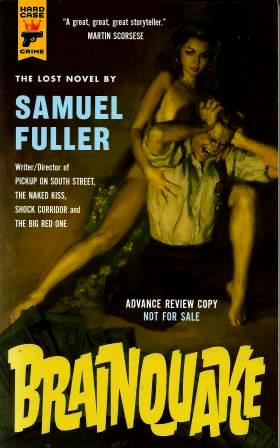
What I had not appreciated was that Sam Fuller also wrote noirish novels, but fortunately Charles Ardai of the Hard Case Crime imprint (of Titan Books) was well aware of the fact and jumped at the chance to publish Brainquake for the first time in English, having only appeared before now in Japanese and French. (Fuller lived in self-imposed exile in France for many years, only returning to the USA shortly before his death in 1997).
The posthumous publication of Brainquake has prompted me to track down the recently ‘reconstructed’ version of his classic (an autobiographical) 1980 war movie The Big Red One.
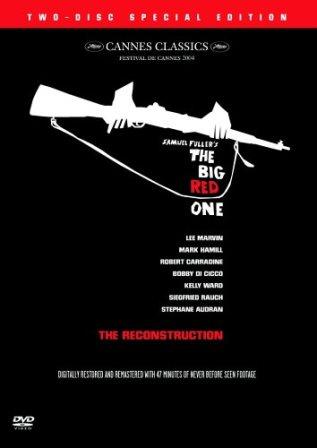
It is many years since I first saw it, but the scenes towards the end where the American soldiers of the First Infantry Division liberate a Nazi concentration camp have stayed with me. What must it have been like for Sam Fuller, who actually lived the experience and, because he owned a 16mm cine camera, was ordered to film the scene?
Is this a Dagger…? Probably.
I am so old that I remember the time when the Crime Writers’ Association awarded only two of their trade-mark Daggers – one Gold, one Silver – a year. Now I believe the number is 17 although I am happy to have my arithmetic called into question, something Her Majesty’s Revenue does constantly.
The most recent increase in Daggers, which some may see as a dilution of a unique brand, has been into what I can only describe as ‘showbiz’ for I understand that the list of categories now includes Film Dagger, TV Dagger, International TV Dagger, Best Actor Dagger, Best Actress Dagger, Best Supporting Actor Dagger and Best Supporting Actress Dagger.
Now I am not one to disparage film or television drama and I have even been known to talk to and break bread with actors before now, but am I alone in finding it curious the Crime Writers’ Association seems to giving Daggers for performance and production whilst totally ignoring the work of scriptwriters?
I am reminded of this curious state of affairs by the fact that the popular ITV show Scott & Bailey (which has attracted larger audiences than Downton Abbey) has just started its fourth season. Whilst it has won an ‘acting Dagger’ in the past, I do not think the series has received anywhere near the recognition it deserves for promoting the role of women in television. Not only was the show created by two female producers (Sally Wainwright and Diane Taylor), but two of its stars - Suranne Jones and Amelia Bullmore – are responsible for writing the scripts for more than two dozen episodes.
The spin-off novels from the series are also written by one of our leading female crime writers, Cath Staincliffe and the latest ‘prequel’, Ruthless, is published by Corgi this month.
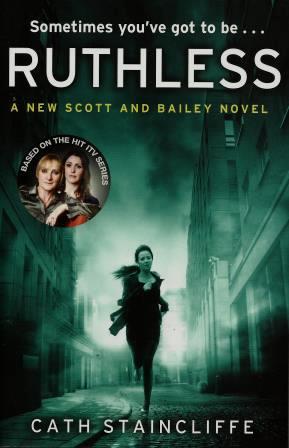
The Shetland Bus
If the legendary ‘Shetland Bus’ was in fact a vehicle rather than an heroic World War II operation, then it would no doubt have been much used this month ferrying thousands of fans to bookshops to by the new Shetland novel from Ann Cleeves, Thin Air, published by Macmillan just before the Scottish Referendum. (Coincidence? I think so.)
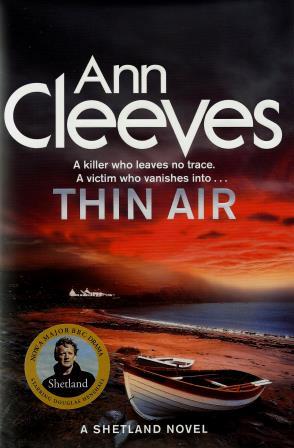
Whilst one of Ann’s televised crime series Vera continues to pick up accolades and viewers, the other string to her bow, the Jimmy Perez novels are now firmly established on the BBC as Shetland, starring the always-watchable Douglas Henshall. The new novel, featuring detectives Perez and Willow Reeves, is set on Unst, Shetland’s most northerly island and a little bird (a feisty Arctic Skua perhaps?) tells me that it is possibly Ann Cleeves’ best book so far.
|
|
Writer with Three Names
The first time I asked someone if they had ever read a Ryan David Jahn thriller, they replied: ‘Ryan David John what?’ I explained that Jahn was a surname, not a third Christian name, but people often have trouble with my accent. You see, it’s educated.
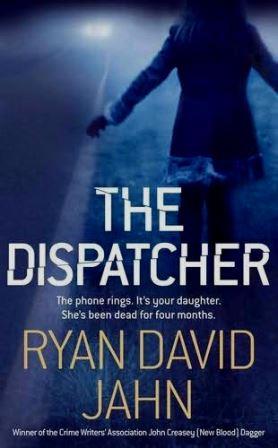 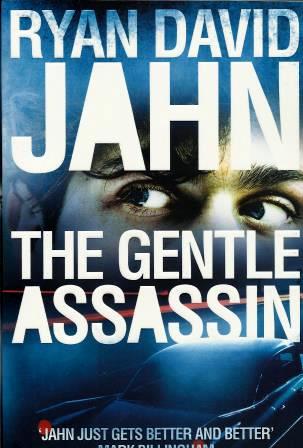
However, suffice it to say that I enjoyed Mr Jahn’s 2011 violent road-trip thriller The Dispatcher and am delighted than Pan have just published, as a paperback original, The Gentle Assassin, which looks to be every bit as gripping and Ryan Jahn is staking a permanent place at the high table of poetically brutal hard-boiled crime writing.
Postcards from the Edge of Crime
When I first dabbed a tentative toe into the murky waters of crime fiction many years ago in the last century, I was pleasantly surprised by the rather quaint way in which crime writers communicated with each other. This was, of course, long before the use of emails and the preferred method seemed to be to write everything you wished to say on one side of an illustrated postcard, then place it in envelope and send it by first class post, thus ensuring that the postcard arrived in pristine condition, unsullied by postmarks and stamps.
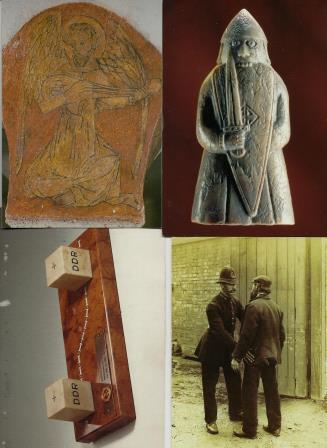
As a consequence, I have a large collection of postcards from luminaries in the crime world, including Robert Barnard, Reginald Hill, Alan Williams, Catherine Aird and Paul Doherty, for the practice was quite widespread. It was not universal, though. Writers such as Colin Dexter and Harry Keating preferred to compose letters in their best handwriting and that old rascal Rodney (Inspector Frost) Wingfield communicated solely by Fax and I believe that included his notes to the milkman.
Pride of place in my collection goes to a card showing Valazquez’s painting Man (c.1638) which was sent to me by the late Reg Hill, who wrote (among other things): I hope you like this painting as much as I do. It captures perfectly what I feel like most mornings.

Very few of the current generation seem interested in continuing the tradition – indeed many of them probably do not know what a postcard, a stamp or a post box are. There are a few – Andrew Williams, for example, who shows impeccable taste in his choice of subjects – but it is rare these days so great is the temptation to use email and the other methods of “social meeja” which I am told exist out there somewhere. To do my bit to help keep the old traditions alive, I vow that from now on I will respond to all my fan mail by means of a tastefully illustrated postcard in an envelope. I have discovered, in a secret drawer in my escritoire a book of six First Class stamps with only two missing, and that should keep megoing for a year or so.
Noir – French for Noir
I was very excited to read in their Spring 2015 catalogue that Serpent’s Tail intended to publish two novels, Fatale and The Gunman, by the late Jean-Patrick Manchette (1942-1995), sometimes referred to as ‘the king of French noir fiction’ and occasionally as ‘the antidote to Maigret’.
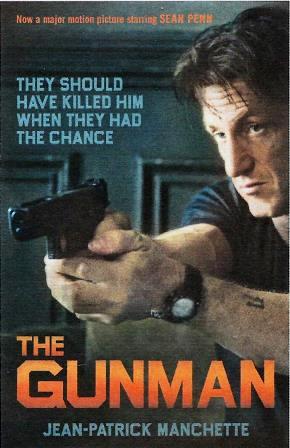 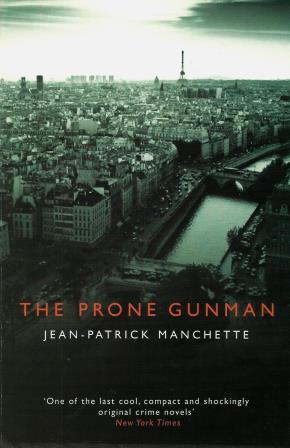
The Gunman, to be published next February, dates from 1981 and is reissued to coincide with a film version starring Sean Penn, Idris Elba and Javier Bardem. My excitement waned somewhat when I realised I had already read this book when Serpent’s Tail first published it in 2006 under the title The Prone Gunman, however it means I can recommend it with some authority.
I have not read Manchette’s Fatale but am looking forward to it, especially as it comes with an Introduction by David Peace, who knows a thing or two about noir fiction.
Agatha Christie – Time Lord?
I have detected a slight rumbling in the soft underbelly of the jolly old interweb, or at least that part of it occupied by ‘bloggers’ on the subject of crime fiction, concerning the new TV adaptations of Agatha Christie’s Tommy and Tuppence Beresford stories under the series title Partners In Crime to be broadcast next year..

The rumbling is not so much about the casting of David Walliams and Jessica Raine, but rather the setting, which is said to have been firmly placed in the 1950’s, whereas the Agatha Christie source novels appeared over the period 1922 to 1973, though not – as far as I can discover – in the actual decade of the 1950’s.
Now this does not exactly cause me any sleepless nights and not just because Tommy and Tuppence are my least favourite Christie protagonists, as I have always subscribed to the Colin Watson theory of ‘Mayhem Parva’ for the Miss Marple stories. In other words, the settings Agatha Christie so successfully created and perpetuated for her puzzles were not time sensitive, rather they were timeless, just as P.G. Wodehouse’s world of Jeeves and Wooster was timeless.
What I find more worrying is a comment attributed (I think) to the producers which claims that the setting has been relocated to a generic 1950s that is still within living memory for its target audience. That surely is a hostage-to-fortune and a rather limiting mission statement for the producers of popular television shows, unless SAGA has started up a channel I am not aware of. (Which, having only recently discovered BBC4 is perfectly possible.)
However, to prove my contention that Agatha Christie had something of the Time Lord about her (‘Time Lady’ somehow doesn’t sound right), I can offer in evidence the fact that her most popular creation, Hercule Poirot, is now back in action 39 years after his last appearance (and death) in print. I am reliably informed that one of the quartet below is not actually the famous Belgian detective but rather his newly-begot creator (re-creator?), that distinguished contemporary crime writer Sophie Hannah.
 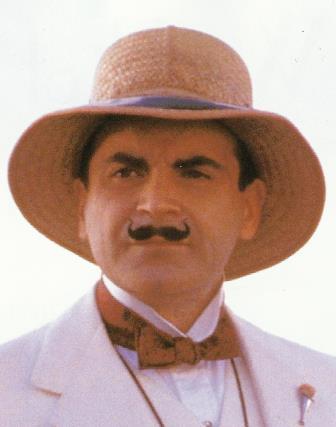
 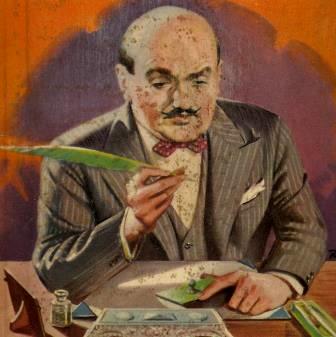
I refer, of course, to The Monogram Murders, published last month by HarperCollins who have really done a masterly job on the presentation of the book with a textured dust jacket with a clever Poirot silhouette on the inside of the dust jacket, and wonderfully stylish endpapers.
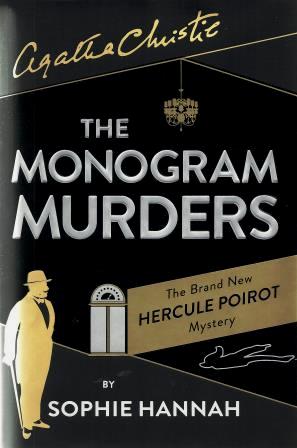 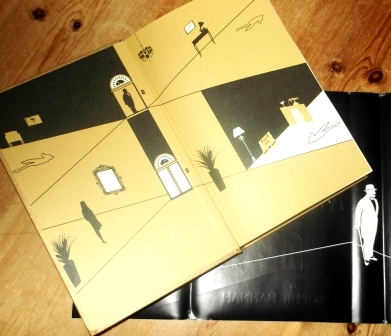
The Monogram Murders, which begins with a triple murder (or does it?) in a fashionable London hotel, is set in 1929. That, I believe, puts it between The Mystery of the Blue Train (1928) and Peril at End House (1932) in the Poirot canon, if such a thing matters. All that is really important is that we are in the company of Poirot and deep in Christie country, where time doesn’t really matter – unless, of course, it provides a convenient alibi; or two, or three.
Sophie Hannah’s respectful and clearly fond ‘take’ on Poirot in The Monogram Murders is the most high-profile example of ‘continuation fiction’ which has, in the past year, seen revivals in the careers of Lord Peter Wimsey, Albert Campion, Phillip Marlowe, James Bond, Robert B. Parker’s Spenser, a young(er) Inspector Frost, Nero Wolfe and umpteen further adventures of Sherlock Holmes.
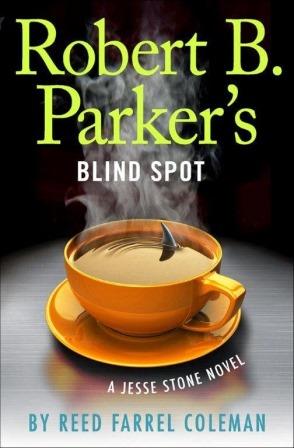
Now a second character created by the late Robert B. Parker, Jesse Stone, is getting the continuation treatment in the new novel just published in the USA, Blind Spot, by Reed Farrel Coleman, proving you just can’t keep a good character down.
Name Dropping
My aversion to name-dropping is, I hope, clear to all and I have never made a secret of my despair for poor Colin Bateman – without question the funniest (and probably bravest) crime writer in Northern Ireland – who has had to suffer for many years simply as Bateman.
Now with his new novel just published by Headline, The Dead Pass, his full name is restored to the cover.

Sadly though, Colin can no longer count himself among those mononymous celebrities such as Twiggy, Sting, Madonna, Bono, Cher and Divine. I somehow don’t think he will mind too much.
Essex Girls
I remember it was a bitterly cold day back in 2007 when Seona Ford and I participated in an outdoor commemorative service to mark 50 years since the death of Dorothy L. Sayers, standing and shivering by the statue of DLS in the small Essex town of Witham, where she lived and worked for many years.
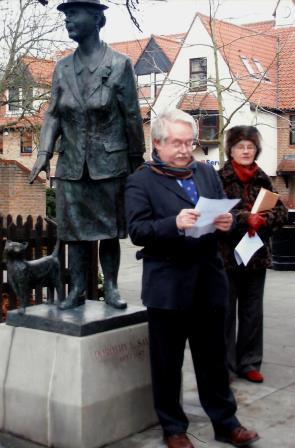
I was reminded of that rewarding, if chilly, event when I heard Seona (now Chairman of the Dorothy L. Sayers Society), on BBC Radio 4’s ‘Great Lives’ programme last month, talking about Dorothy L. Sayers with lifelong Sayers fan Dame Stella Rimington, thriller-writer and former Head of MI5.
Immediately I kicked myself for not having ascertained Dame Stellas’s admiration for Dorothy L. Sayers before then, but it was simply not a subject we had covered in any of our meetings, or ‘interrogations’ as she sometimes referred to them – though I have no idea why.
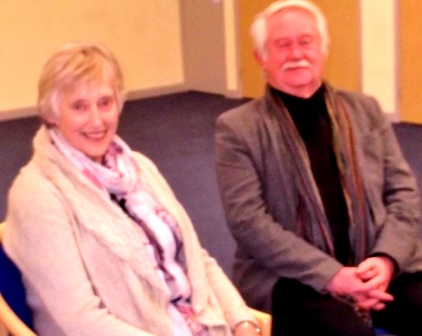
Had I known of her love for the works of DLS, I would have certainly attempted to recruit Dame Stella to give the 2015 Dorothy L. Sayers Lecture, which traditionally takes place in Witham during the Essex Book Festival. However, I have been well beaten when it comes to that particular prize, for Seona Ford has already done the deal and booked Dame Stella for the event.
I may or may not provide details of how to obtain tickets for the lecture in a future column, but only after I have secured one for myself.
No Prizes
Last month I set a little competition asking for the identity of the internationally best-selling author responsible for this signature in one of his signed first editions:

I am torn between pleasure and shame when I report that not a single correct entry was received here at Ripster Hall and so the prize – one of my novels neatly autographed – will go unclaimed.
Perhaps I will send it to Michael Connelly, whose signature it was…the only trouble is I cannot decipher the address he scribbled down for me.
Short Shorts
I was rather shocked to discover, from a publisher who clearly specialises in hiding lights under bushels, that my old and distinguished friend Catherine Aird had published a collection of short stories under the title Last Writes over three months ago. I had been totally unaware of the event (Catherine being far too modest to blow her own trumpet); otherwise I would certainly have recommended this gentle, charming and distinctly mischievous fictional compendium of twenty-two original tales.
Fans of Catherine Aird can rest assured that several stories feature her series detectives Sloan and Crosby, but even more take place (at various times) in her ‘series county’ of Calleshire. Diehard Calleshire addicts will be relieved to find the familiar setting of Berebury (where Calleshire’s police HQ is situated), and Calleshire experts need no reminding that Berebury lies inland and to the north-east of Kinnisport, though only the true Aird aficionado knows the significance of the name ‘Kinnisport’.
Among the delights (there are many) of Last Writes is the opportunity to improve one’s vocabulary. For example, I now know what a chronogram is (and why the date 1666 is important, though as a Latinist I should have known that) and have learned to address someone hortatively. I maintain that I already knew – though few will believe me – the meaning of the 16th century Scottish dialect word diablerie.
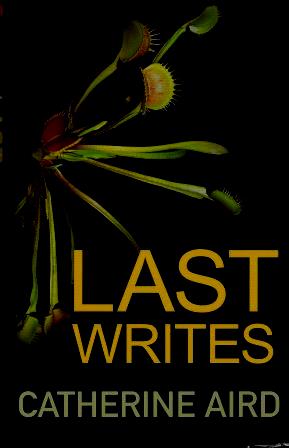 
Having been caught short, as it were by Catherine Aird’s short story collection, I am indebted to those wiser heads who look after best-selling author Peter James, for thanks to their tip-off, I am really looking forward to his (first ever) collection of short stories in A Twist of the Knife which is to be published by Macmillan in early November.
Whilst I have missed the opportunity to enjoy a Catherine Aird story or two sitting in the grounds of Ripster Hall of a warm summer’s evening, I am sure I will enjoy a Peter James story or two in front of a roaring log fire come November, and to be honest, I have always felt that criminous short storieswere ideally suited to being read in front of a real fire whilst nursing a balloon glass of brandy.
Rogue Justice
I am given to understand that an electronic version of Geoffrey Household’s brilliant thriller (“wartime noir” at its best) Rogue Justice will soon be made available by Orion.

Whilst I am, of course, delighted if the electronic version manages to bring the name of Geoffrey Household to the new generation of youngsters who clearly have problems with real books, I would take this opportunity to remind the more discerning reader that Household’s 1982 novel (his long-awaited follow-up to his 1939 classic Rogue Male) is still available as a Top Notch Thriller. I know, as I was the proud editor who, in 2011, got it back into print after a disgraceful absence of 27 years.
Memories of the Middle Ages
I remember with great fondness the night I accompanied Ariana Franklin and her husband, Barry Norman, to the 2007 Ellis Peters Awards when ‘Ariana’ (Diana Norman) deservedly won for her splendid historical mystery Mistress of the Art of Death. It was a memorable evening, not least for the fact that it was the one and only time I had accurately predicted an award winner.

At the time of her untimely passing in 2011, I knew Diana was working on another novel set in the 12th century and that the fen country of East Anglian, which Diana and I shared a mutual affection for, would figure in it.
I am therefore sad that Diana could not finish Winter Siege, but delightedthat her daughter, Samantha Norman has done so and that it will be published by Bantam this month.

A Guru in Middle Earth
I know I am not alone in regarding Paul Thomas as the Godfather of modern crime writing in New Zealand. Frankly, I don’t care if I’m alone as I’m right and his Death on Demand – published here by Bitter Lemon Press – was certainly my favourite crime novel of last year.
I am delighted that he has a new book out this year – Fallout – though only, so far, in New Zealand. I am flattered and honoured to discover that my recommendation of Death on Demand has been notedon the dust-jacket of Fallout and indeed I have been granted the great honour of being awarded the title of “UK Crime Fiction Guru” – a title I will cherish forever and immediately have incorporated on to my official Shots business cards.

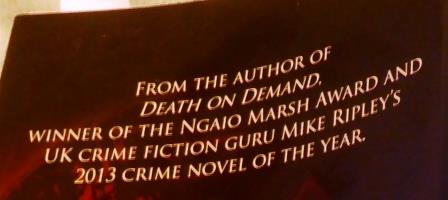
Blessings ,
The Ripster.
|